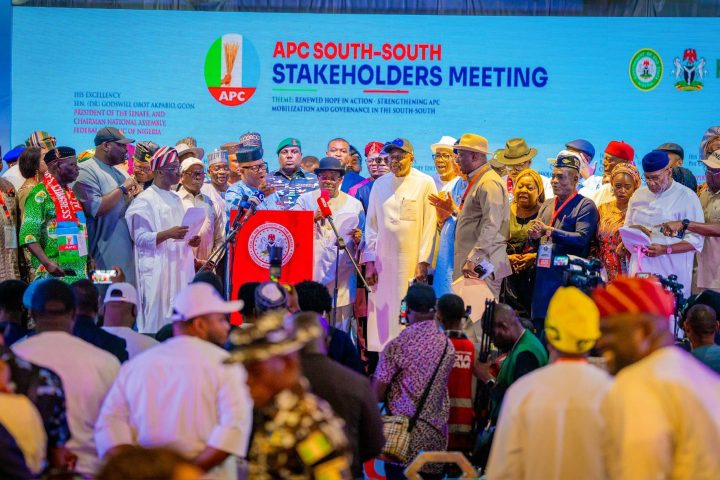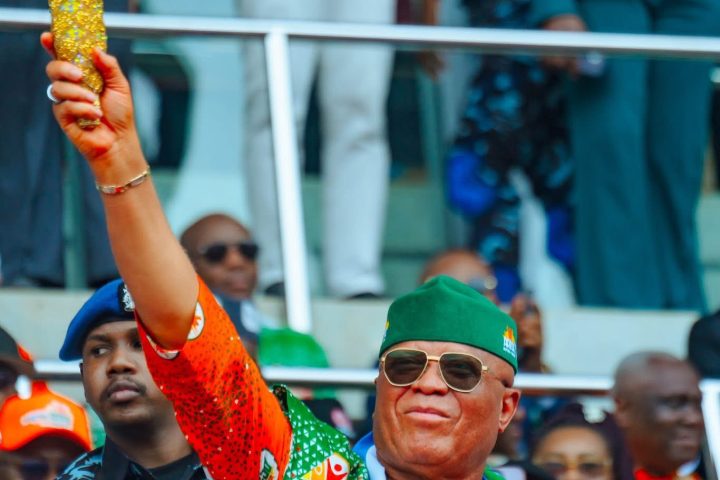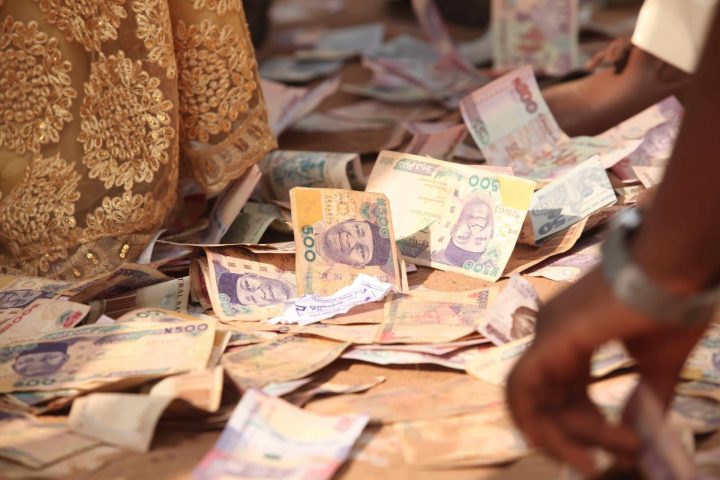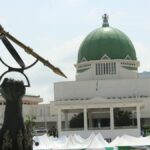Whenever Nigeria’s National Assembly wants to distract Nigerians from their daily cross of hardships, it springs a surprise bill. Mid-week, May 23, the House of Representatives and the Senate gave a swift passage to a bill seeking to change a seemingly innocuous national anthem to an old anthem, which was replaced with the current one “Arise, O Compatriots in 1978.
Leading the pack of opposition to the bill was House Minority Leader, Kingsley Chinda, who said the bill had a colonial toga, and should not be the priority at a time of more dreadful national dilemmas. Recall that the words of the old anthem were supplied in 1959, just before independence by a Brit, Lillian Jean Williams, while he lived in Nigeria. Less well known Frances Berda finally composed the words into an anthem. Due to the very poor, if any, Nigerian input, the present anthem ended the 18-year rendition of ‘Nigeria We Hail Thee’, 1960-1978.
Join our WhatsApp ChannelListen to the audio here:
Many attacks have also trailed the attempt to change the national anthem. Is Tinubu looking for a quick presidential landmark? Many Nigerians wished that the lawmakers give as much speedy passage to other laws aimed at building strong national institutions, ending insecurity, entrenching patriotism and upgrading inclusion. For instance, there have been inexplicable delays in bills seeking to entrench better security (e.g., state police), resource control, constitutional, political, judicial, electoral, and fiscal reforms etc.
But wait. Do Nigerians Really Believe in Arise O’ Compatriots
Not at all. It is hard to see any analysis praising the current anthem. Many see it as empty, vague and a huge lie. Arise O’ compatriots or co-traitors? Nigerians have been knocked out almost beyond the ability to rise by co-conspirators and co-traitors called politicians. The country is bitterly divided along ethnic, political and religious lines, and the notion of compatriots is barely meaningful.
‘Nigeria’s call obey’. The call that many Nigerians hear the most is funeral invitations and gunshots; the call to corruption and bad leadership. ‘To serve our fatherland’ when millions are fleeing the country through deadly deserts. ‘With love and strength and faith,’ all severely drained by hunger, fear and insecurity. ‘The labours of our heroes past shall never be in vain.’
All of the heroes, especially the post-independence ones, have become villains because they did not negotiate a workable Nigeria, having quickly taken it to war and hatred. The state of the country now makes them hardly heroes, and their labour a terrible vanity, with Nigeria being one of the worst places to live; the poverty capital of the world, where over 80 million go to bed hungry every day. ‘To serve with heart and might, one nation bound in freedom, peace and unity.’
Very tough to imagine. Ethnicity, land grabbing, communal fight, feudal oligarchy and religious politics have bred disunity, dispossessions, mutual distrust and sworn tribal hatred that have combined to break the hearts, destroy the collective might, and enchained our freedom and unity.
No wonder some have described the current national anthem as a dirge, composed and supported by those who felt the guilt imposed by the words of the old anthem after a three-year brutal indiscretion called the Nigeria Civil War.
The Power of Words
It is well. These words have become a song, a catchphrase and almost an epitaph used by millions of heavily religious minded Nigerians to signify hope in the midst of utter hopelessness. That is the first thing about the old anthem, if it is adopted again, i.e., hope. Presidential orders, traditional battle cries, religious worship, mass media messages, orchestras, the world of music, video, etc. These are areas where words, songs and praise worship can change the course of men and the course of history by inspiring hope.
There is power in words when you consider the techniques of propaganda, indoctrination, communication campaigns, crisis management, and indeed every kind of socialization and orientation. As argued by the House Leader, Professor Julius Ihonvbere, the old anthem is capable of becoming a national symbol and sign of authority. And President Bola Tinubu recently assured that Nigeria was no longer bleeding, as the nation is moving to prosperity. If so, we need a new anthem to herald this prosperity. Billionaire businessman, Jimoh Ibrahim also said: “If Nigeria will get the National anthem right, we will get Nigeria right.” Accordingly, the Senate leader, Bamidele Opeyemi, who sponsored the bill, argued that the old anthem was in line with the vision of President Bola Tinubu’s administration and will uphold national unity.
What is in a National Anthem?
All that we have just enumerated above. A national anthem does not put food on the table. It does not remove inflation, or bring security and ethnic love. But only directly. Indirectly, Nigeria needs to heal from the heart to the head, and then to the hand. This sense of healing is well imbued in the old anthem that may soon become new.
Certainly, for pride, for the sake of learning, and with a sense of renewed hope, many Nigerians may want to learn the old, and make it new. Someone may receive a new inspiration, and think twice before indulging in micro-corruption and parochialism, which are the seeds of the present-day monster of bad governance and the associated psycho-social upheavals.
Yet, There is More With Audacious Words
It might seem as if the old anthem is free of contradictions. It is not. But it was never allowed to be the emblem of our national struggle and pride for quite long. The old anthem looks to the future, and calls Nigerians to action, beckoning on people to feel the strength to live the Nigeria of their anthem. As of now, the words of the anthem don’t capture the present realities of Nigeria, but it can be a beacon for the surge towards the Nigeria we all want due to its capacity to reset the nation’s psyche, if leaders truly work towards change.
READ ALSO: 0.5% Of Nigeria’s Top 2000 Politicians, Governors Send Their Children To Nigerian Schools
Nepal, South Africa and Germany a few of the countries which tinkered with their national anthems over time. Nepal accused its former anthem of pandering to monarchical autocracy, and changed it in 2006, after it introduced multiparty democracy. Within two years of stripping the anthem of vainglorious praise worship of monarchs, the country overcame monarchy. South Africa in 1997 got a blend from the previous National Anthems in English and Afrikaans. Its newer Nkosi Sikelel’i Afrika (God bless Africa) drives more towards the country’s culture and strength after apartheid. By 1841, Heinrich Hoffmann von Fallersleben (the lyrics) and Joseph Haydn (the music) combined to give Germany its national anthem. In 1952, after the World Wars, Germany retained only the third stanza to emphasize inclusion, unity, justice, and freedom. Hopefully, the words of the old anthem are far more likely to etch strongly on the mind towards positive outcomes.
Nigeria we hail thee,
Our own dear native land,
Though tribe and tongue may differ,
In brotherhood we stand,
Nigerians all, and proud to serve
Our sovereign Motherland.
Our flag shall be a symbol
That truth and justice reign,
In peace or battle honour’d,
And this we count as gain,
To hand on to our children
A banner without stain.
O God of all creation,
Grant this our one request,
Help us to build a nation
Where no man is oppressed,
And so with peace and plenty
Nigeria may be blessed.
Dr Mbamalu, a Jefferson Fellow and Member of the Nigerian Guild of Editors (NGE), is a Publisher and Communications/Media Consultant. His extensive research works on Renewable Energy and Health Communication are published in several international journals, including SAGE.
SMS/Whatsapp: 08094000017
Follow on X: @marcelmbamalu
Dr. Marcel Mbamalu is a communication scholar, journalist and entrepreneur. He holds a Ph.D in Mass Communication from the University of Nigeria, Nsukka and is the Chief Executive Officer Newstide Publications, the publishers of Prime Business Africa.
A seasoned journalist, he horned his journalism skills at The Guardian Newspaper, rising to the position of News Editor at the flagship of the Nigerian press. He has garnered multidisciplinary experience in marketing communication, public relations and media research, helping clients to deliver bespoke campaigns within Nigeria and across Africa.
He has built an expansive network in the media and has served as a media trainer for World Health Organisation (WHO) at various times in Northeast Nigeria. He has attended numerous media trainings, including the Bloomberg Financial Journalism Training and Reuters/AfDB training on Effective Coverage of Infrastructural Development of Africa.
A versatile media expert, he won the Jefferson Fellowship in 2023 as the sole Africa representative on the program. Dr Mbamalu was part of a global media team that covered the 2020 United State’s Presidential election. As Africa's sole representative in the 2023 Jefferson Fellowships, Dr Mbamalu was selected to tour the United States and Asia (Japan and Hong Kong) as part of a 12-man global team of journalists on a travel grant to report on inclusion, income gaps and migration issues between the US and Asia.
















Follow Us